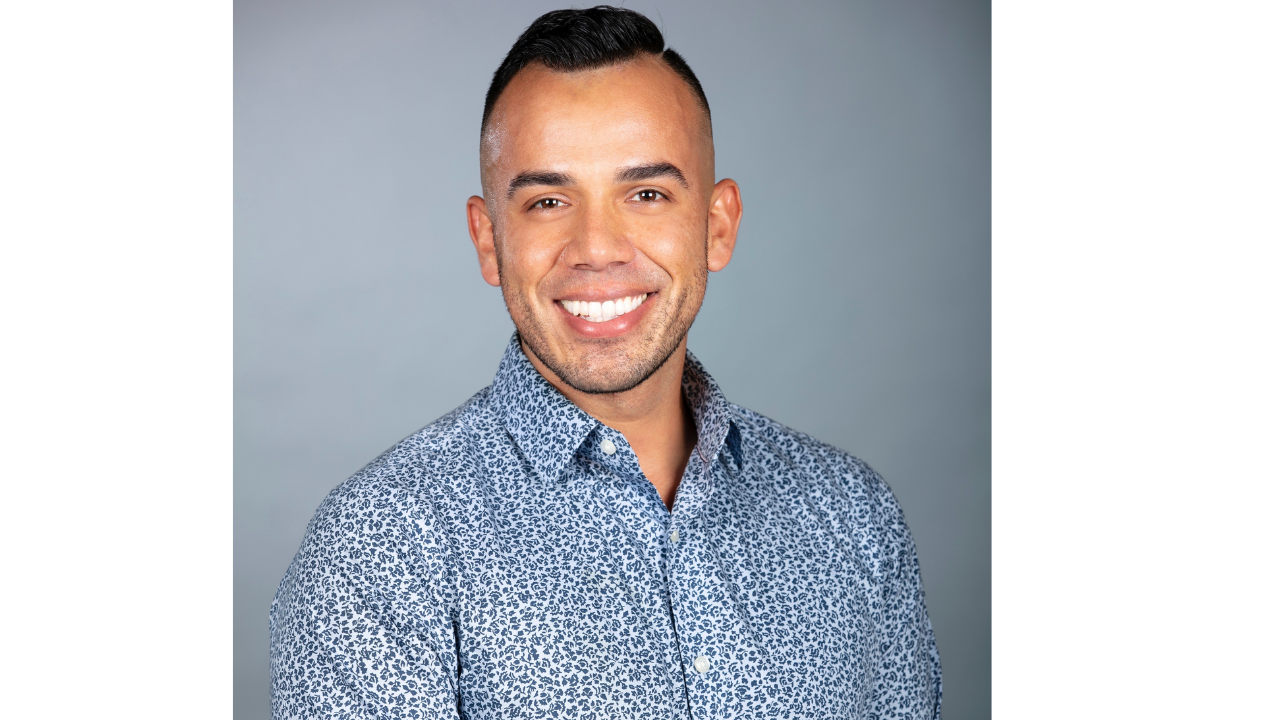Ethnic Labels, Latin* Lives: Q&A with Dr. Cristóbal Salinas Jr.

About
Cristóbal Salinas Jr., Ph.D., is an associate professor in the Educational Leadership and Research Methodology Department at Florida Atlantic University’s College of Education. Prior to this, Dr. Salinas served as the multicultural liaison officer at Iowa State University’s College of Design, where he provided assistance and guidance in understanding issues of diversity at the college, university, and beyond. He holds a B.A. in Spanish Education and ESL from the University of Nebraska at Kearney, and a M.Ed. in Educational Leadership & Policy Studies and Ph.D. in Higher Education, both from Iowa State University.
Dr. Salinas migrated from Mexico to the U.S. during middle school, forcing him to adapt to a new culture all while learning a new language. Those experiences provided him with an awareness and understanding of the challenges that many multicultural students face within education. It is from these experiences that he frames his teaching and research interests. His research promotes access and equality in higher education and explores the social and political context of education opportunities for historically marginalized communities. His research reflects the lived experiences of, and is in partnership with, historically marginalized communities that are oppressed at the institutional, cultural, and individual levels. At the institutional level he studies community colleges and its communities of people; at the cultural level he explores hazing and the power language; and at the individual level he focuses on the experiences of men of color in educational settings.
Dr. Salinas is the founder and Editor-in-Chief for the Journal Committed to Social Change on Race and Ethnicity (JCSCORE), published in partnership with the National Conference on Race and Ethnicity in American Higher Education (NCORE). He has published over 17 peer-review articles, 30 book chapters, co-edited 5 books, among other creative scholarship. Dr. Salinas has received over 25 international and national awards for his service and commitment to social justice, diversity, equity, and inclusion. His research has been featured in CNN, CNN Español, NPR, and Good Morning America.
Website: http://drcrissalinas.com/
Twitter: @drcriss_salinas
Instagram: @drcriss_salinas
Facebook: @criss1
Q&A
What sparked your interest to research the term “Latinx”?
The first time I saw the term “Latinx” was via social media when a student affairs colleague and friend was promoting the Latinx Leadership Retreat at Iowa State University (ISU), formerly known as the Latina/o Leadership Retreat. Then, at a conference (NASPA), another former ISU alumni, Dr. Adele Lozano, (faculty at University of Wisconsin, La Crosse) and I met to discuss our research agendas. During the meeting we both asked each other, “Have you seen the term Latinx? What does it mean?” What intrigued me was that people would ask me, “What are your pronouns?” but they would not respect those pronouns. For example, people would call me “Latinx,” even if I self-identified with the he/him/his pronouns and as a Latino. If people are assigned pronouns, then the term should be matching with the race-gender term (i.e., Latino, Latina, Latinx, Latine). As a result, Adele and I started to study how associations/conferences, organizations, and colleges and universities were using and defining the term “Latinx.” From this thinking and experiences, Adele and I wrote our first paper titled: Mapping and recontextualizing the evolution of the term Latinx: An environmental scanning in higher education. This peer-reviewed paper used data to begin to understand the term “Latinx.”
It is important to note that my research started trying to understand the term “Latinx,” and not who is Latinx. I felt the need to understand what the term was, before I use it as an identity for me or others.
Since the first article, my research has evolved. The findings of the 2017 paper are now challenged in my most recent paper 2020: The Complexity of the “x” in Latinx: How Latinx/a/o Students Relate to, Identify With, and Understand the Term Latinx. In this paper, I critique my own research. I believe that researchers can generate new questions and ideas with the goal of finding a deeper understanding of an issue, but overtime, those initial ideas should, when applicable, be challenged.
Describe the development of your argument to use “Latin*.” Why do you suggest this shift from other terminology like “Latinx”? Also, the contrast between the use of this term in academic settings vs the home.
In 2017, we said that the term “Latinx” included all genders and people of Latin American descent. However, in my 2020 paper, I found that the term “Latinx” was not necessarily inclusive of all genders and people of Latin American descent. First, the term “Latinx” has been grounded in Spanish and it works in English. While it works in Spanish and English, it does not work for all other languages. For example, the letter “x” can be pronounced in 8 different ways in Portuguese. When I asked Brazilians, Portuguese speakers, to pronounce the term “Latinx,” all provided different pronunciations. Also, in 2017 we made the argument that the term “Latinx” was rooted in indigenous languages such as Aztlán, Nahuatl, and Zapotec. However, when I interviewed students from South America, some said: “I am not Latinx. Because in my indigenous language and nation we do not use the ‘x.’” For example, the Quechua, Garifuna, and Purépecha, just to name a few, do not use the ‘x’ in their alphabet.
To add to this complexity, we should also understand the terms “Hispanic” and “Latino.” The term “Hispanic,” derives from the Latin word for Spain, “Hispania,” which later became España and it is still used today in education spaces for individuals from Spanish-speaking countries, but excludes Belize, Brazil, French Guiana, Guyana, and Suriname.
In contrast to the term “Hispanic,” “Latino” has been used to indicate the inclusion of geography regardless of the language spoken. For example, Latino includes individuals of Mexico, Central America, South America, and Caribbean heritage living in the United States. While the most common argument for the use of the term “Latinx” has been “grounded in its centricity of the Spanish language” (Salinas, 2020, p. 153) and it “works both in Spanish and English” (DeGuzmán, 2017, p. 218), no research that I’m aware of has been conducted on how Latinx works for Latin American people that are not mostly Spanish- or English-speaking. From the language perspective and argument, the terms “Hispanic” and “Latinx” aim to do the same. Both terms dismiss individuals from Latin American countries, including Belize, Brazil, French Guiana, Guyana, and Suriname and some indigenous communities because they speak a language other than Spanish. Latino is used to refer to people of South and Central America, Mexico, and Caribbean heritage living in the United States. Yet, Latinx is grounded in its centricity of the Spanish language.
Furthermore, people have made an argument that Latinx is inclusive of all people of Latin America descent and origin, and of “transgender and queer folks,” “gender-non specific,” “gender-free,” “LGBTQ,” “genderqueer,” and “Trans,” among others. However, in my 2020 research paper, I found that that some Transgender people did not identify with the term “Latinx.” It made me question and think how the term “Latinx” misgendered or gendering people as there are Transgender people who do identity with a gender, for example, a Latina transgender woman or a Latino transgender man.
In my 2020 research paper, I also found that people understood the term “Latinx” as a “US centric term.” Therefore, they adopted one of the following terms: Latiné, Latinu, or Latini. Given the various ways of how people self-identified, and how language, gender, sex, nationality, race, ethnicity, religion, among other identities intersect, I coined the term Latin*. (Spanish pronunciation of "Latino" or "Latina" without the "o" or "a.")
The term Latin* is not to homogenize Latinidad but rather to seek a new understanding of the identification of and by people of Latin American origin through a new term. Latin* is an all-inclusive term that considers the fluidity of social identities. Latin* is not a gender identity in itself, but rather creates a space that encompasses gender fluidity and identity labels that already exist, as well as those that have yet to be included in the mainstream vocabulary. Lastly, Latin* invites people to self-identify appropriately as the term serves as a place-holder for new and emerging terms that gives voice to Latin American people. Given the alteration of various terms, I promote the term Latin* to consider Latinx, Latiné, Latini, Latinu, Latino, Latina, Latina/o, Latin@, Latin, or Latin American.
How do you approach people with a “Hispanic/Latino” background? Do you call them “Latin*”?
If I know someone’s race-gender, I would not call them Latin*. However, Latin* is intended to serve as a deliberate intervention—a pause for people to consider the various ways in which people from Latin American origin and diaspora in the United States may identify. It is important to recognize that we should also use the terms Latinx, Latiné, Latinu, or Latini to represent people that truly do not identify with the man/woman binary. We must respect their identities. We must use the right term that they self-identify. Again, my goal is not to erase or challenge the identities of Latinx, Latiné, Latinu, or Latini people. I see my role as a cisgender Latino man researcher, to amplify and elevate their lived experiences, as they need to be represented in all areas of society.
We all know someone (a relative, a friend, ourselves) who has wondered, “Why is terminology suddenly changing?” How do you respond?
The evolution of terms is nothing new. Older generations have been through it. Since 1940, the U.S. Census gathered data on “Persons of Spanish mother tongue.” In 1950 and 1960, the data collected changed to “Person of Spanish surname.” In 1970, the data collected in the US Census included, “Is this person’s origin or descent,” providing people with one of the following options: “Mexican,” “Puerto Rican,” “Cuban,” “Central or South American,” “Other Spanish,” or “No, none of these.” In 1980, the U.S. Census asked, “Is this person of Spanish/Hispanic origin or descent?” Then in 2000, the U.S. Census used “Latino” for the first time. The U.S. government continues to change labels and terms to identify people. The change of terms has a tendency to create hierarchy. And within hierarchy there is both oppression and privilege. The group’s labels/terms that continues to change is the oppressed/marginalized by the privileged who might be afraid of losing their power. This change of terminology is nothing new for a community of people. We have seen similar ways in which the African-American and Black communities labels and terms continue to change and evolve. We, Latin* communities, have a lot to learn from the African-American and Black communities.
People are always evolving. So is culture, language, religion, identity, and many other aspects. As people and society evolve, it is inevitable for language to change.
Basically, ask people how they self-identify in order to know what term to use?
Yes, ask people how they self-identify. It’s better to ask than to make assumptions. For example, we ask people what’s their name, and some people get upset when we misspell or mispronounce their names. It’s a similar analogy to that.
Also, we should continue to educate ourselves. For example, taking courses or reading books on Latin American history, gender and sexual orientation, and women studies. Use educational resources that will challenge our thinking. Also, engage in conversations that will challenge us. As we learn more about privileges and oppression, and as we engage in these conversations, we might feel uncomfortable, but that’s ok. Humans are complex. Rich, respectful conversations help to clarify and provide deeper understanding of how people self-identify, which informs us what term to use.
[Special note: This Q&A has ignited meaningful conversations. One key takeaway is that in the effort to be inclusive, "Latinx" has made an incalculable number of people feel excluded. It strips them of their long-cherished self-identity. People have not spoken up in fear of being branded exclusionary. Therefore, a strategy could be for each college to conduct a survey about the Latinx term, especially to garner the student perspective.]
***
Also visit: Becoming Hispanic-Serving Institutions: Q&A with Dr. Gina Garcia







